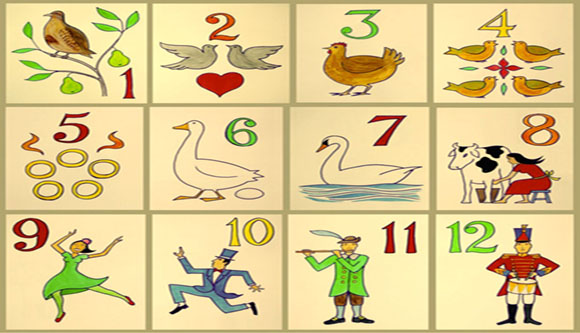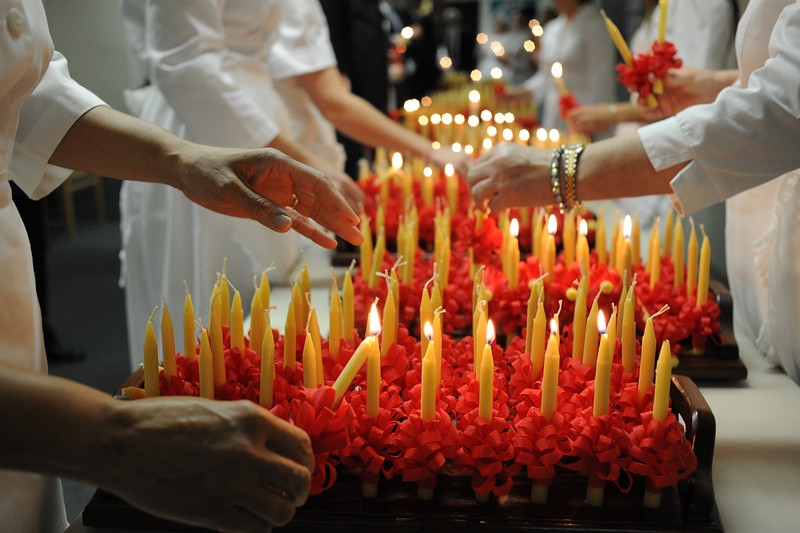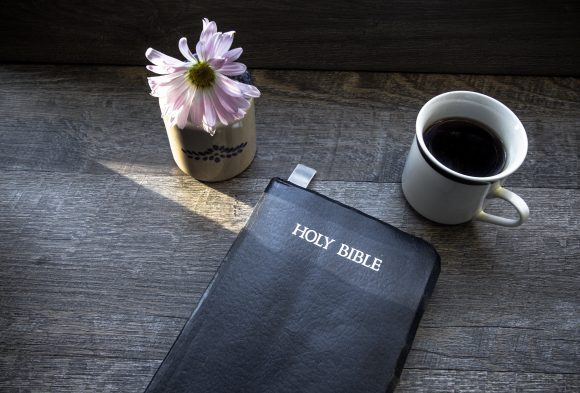The Twelve Days of Christmas
December 31, 2017
New Philadelphia Moravian Church
The days between Christmas and New Year’s are always kind of “off”, kind of different from normal. Christmas is still lingering. Yesterday, as I was getting the golf cart out of the church garage to have it ready to be used this morning, I noticed that the Christmas lights that were on it for Christmas Eve were still burning. Their brightness had dimmed quite a bit, but it was still there. That’s what this week feels like.
The decorations are often still up but they always seem to look a little less colorful and festive than they did last week. There are football games during the middle of the week! Many people take vacation days, school is out and almost everyone has a different schedule. No one seems to even know what day of the week it even is.
For me, that feeling has been heightened by the fact that Kelly and Zach and I are just back from Winter Camp at Laurel Ridge. Zach was a camper (along with 35 other 6th to 12th graders plus a couple of college freshmen) and Kelly and I were the Deans and led the program. We had a wonderful time but it certainly wasn’t the way we would normally spend a Tuesday through Friday. Regardless, it was a great four days of fun and fellowship and even some learning. The program was all about the Twelve Days of Christmas.
The Twelve Days of Christmas are not the 12 days before Christmas but they are the twelve days starting on Christmas Day and ending on Epiphany (January 6). So that would make today the 7th day of Christmas. And on the 7th day of Christmas my true love gave to me seven swans a-swimming. Most of our familiarity with the twelve days of Christmas comes from the song- the one where the true love gives increasingly elaborate (and often strange) gifts for each of the 12 days. And the gifts are cumulative, so over the 12 days of Christmas, you get 12 partridges in 12 pear trees and so on for a total of 364 gifts. Despite the lack of any real relatability (who wants 3 french hens as a Christmas gift?) the song has become a Christmas tradition.
Kelly and I based our program for Winter Camp on the legend that the song was written as a secret catechism for Catholics in England. The theory is that it was a code to help young Catholics learn the basics of their faith at a time when Catholicism was outlawed in England. While it is only a legend and there isn’t really any way to prove that that is why it was written or what it really means, it is interesting.
Each of the 12 days represents a basic point of Christian doctrine. “My true love” who gives all the gifts is God, the partridge in a pear tree is Jesus, the 2 turtle doves are the OT and NT, the 3 French hens equal faith, hope and love, the 4 calling birds are the 4 gospels, the 5 golden rings are the Pentateuch (the first 5 books of the OT) the 6 geese a-laying are the 6 days of creation, the 7 swans a-swimming are the 7 gifts of the Holy Spirit, the 8 maids a-milking are the 8 Beatitudes, the 9 ladies dancing are the 9 fruit of the Spirit, the 10 lords a-leaping are the 10 Commandments, the 11 pipers piping are the 11 FAITHFUL disciples, and the 12 drummers drumming are the 12 points of doctrine in the Apostles Creed.
Sharing this with the kids at Winter Camp was lot of fun and led to some interesting discussions about what the basics of our faith and belief are. But sadly, since we were trying to cover 12 days of Christmas in 4 days, we didn’t have time to go into a lot of depth on any of the gifts. And we didn’t really get to talk much about the whole idea that the song was written as a means of sharing faith in secret. Even if that is not really the reason the song was written, even if it is not really what the whole thing is all about, it is still fascinating to think about. Primarily because we rarely, if ever, have had to hide our faith, or practice it in secret.
We live in a time and place where we are free to live our faith and share our beliefs. But not all Christians do. In fact, over the 2 millennia of Christian faith, believers have frequently had to hide what they believed and who they were. Even going back to the very beginning itself. Our Gospel reading for today continues the story of Jesus’ birth and details the time when Jesus himself had to go into hiding for who he was.
It’s interesting how we take the very different Christmas stories from the gospels of Matthew and Luke and combine them into one narrative, even though that was not what the authors intended. We have the angels coming to visit Mary (in Luke’s gospel) and Joseph (in Matthew’s), to tell them that they will have a son and name him Jesus. Then we have Luke’s account of the journey to Bethlehem where there was no room in the inn so the baby was born and laid in a manger; the angels bringing good tidings to the shepherds; and Mary pondering all of it in her heart. In Matthew the wise men follow the star to Bethlehem and find the CHILD (not a baby) in the house (not a manger) and then leave by another way so as not to tip off Herod to Jesus’ whereabouts.
We put it all together in one beautiful story that we put on Christmas cards and in Nativity scenes. But we always end it with the Wise Men and we never include the less acceptable continuation of the story- Herod’s slaughter of all the children under two years old and the flight of Joseph, Mary and Jesus into hiding in Egypt. It’s pretty obvious why we don’t include Herod’s murdering children in our Christmas celebrations. It is less obvious why we overlook the flight to Egypt. But I think I gained a better understanding of it as I considered the theory of the Twelve Days of Christmas being a secret catechism, being a secret way of sharing faith that has to be hidden.
We overlook Jesus having to hide in Egypt because we have never had to hide our faith. We have always been free to practice our faith out in the open. We have always been free to gather here and sing the hymns of faith and share the gospel and proclaim the good news that our Savior has been born. And while that is a great thing and a blessing we have that many Christians do not have, it also causes us to miss out on something.
In 2004, I had the chance to see first hand what it was like to have to be a Christian in secret. A colleague in ministry offered me the opportunity to join him on a mission trip to China. We were to spend 3 weeks teaching Chinese Christians how to teach the Gospel and the basics of Christian faith. We journeyed from the United States to Beijing then onto Shenyang, a city that I had never even heard of but it is the home of 8 million people. On our VISA applications, we listed the purpose of our trip as “visiting friends” since it was illegal to go there to share the gospel. When we arrived, we had to hang out in a tea shop until it was late enough to go to the “seminary” without attracting any attention. The seminary was actually a 3 bedroom apartment that served as a teaching facility for Chinese Christians who came from all over the region.
When we finally were clear to go to the apartment, before we got out of the car, we were instructed to put on our hats and to keep looking down if we passed anyone on the stairwell. It was unusual for Americans to be in the part of the city. It was far away from any tourist places and our arrival would attract attention, possibly unwanted attention. Once we made it into the apartment, we didn’t leave for a week. We weren’t even supposed to look out of the windows because we would risk being noticed. We were joined by 25 Chinese Christians who were anxious to learn new ways to share their faith with the people in the villages that they had come from.
We were only able to communicate through an interpreter, as they didn’t speak English and we didn’t speak Chinese. But that really didn’t matter because what we shared was often shared without words- faith, hope, and love transcend language. The Chinese students traveled for hours on crowded trains to get there. If we had been discovered, I would have just been expelled from China and sent back to the United States. But the Chinese students would have likely faced lengthy prison sentences.
Think about that for a second- imagine being so committed to your faith that you would risk going to prison just to learn more. It is something that I had often read about but until I spent time with people for whom it was a very real possibility, I had never really grasped its importance. It helped me to see how much I take my faith for granted. And how much most Christians in our world take our faith for granted.
When we have the freedoms that we do, the freedom to practice our faith openly and to worship anywhere and everywhere, then we also have the freedom to NOT practice our faith, to not worship. And that is a freedom that we exercise far too often. In the midst of our freedom, our faith has become a faith of convenience. We practice it when it is convenient, when it fits our schedule, when it doesn’t require too much sacrifice on our part.
I recognize that I am preaching to the choir a bit on this one. After all you are here on New Year’s Eve. Maybe I should have preached this on Christmas Eve. But even the best of us, even the most committed among us, are guilty of taking our faith for granted, of practicing a convenient faith. But our God isn’t a God of convenience. Our God is a God of commitment.
God is so committed to us, that he became one of us. As Paul writes “though he was in the form of God, (he) did not regard equality with God as something to be exploited, but emptied himself, taking the form of a slave, being born in human likeness. And being found in human form, he humbled himself and became obedient to the point of death—even death on a cross.” That is commitment.
And it is something that we should not lose sight of during these 12 days of Christmas, or ever. God is so committed to us that he became one of us. He put aside his divinity to assume our humanity. He then gave himself over to death in order to bring us over to eternal life. That is the level of commitment that our God has to us. He literally gave all that he is for us and to us.
It is really hard for us to understand that level of sacrifice. That’s why I’m glad that the account of the flight to Egypt appears during our Christmas celebration. It reminds us, at the one time of year when it is the easiest to be a Christian, that it isn’t always so easy to practice our faith. There have been times, ever since those days right after Jesus was born, when it is downright dangerous. And there have been people who have made great sacrifices to share their faith, to share the Good News of Jesus Christ. Whether it is fleeing from their homes to the safety of anonymity or teaching the basics of faith in secret codes or risking imprisonment to learn how to teach others about Jesus, Christians have always made sacrifices for their faith, for their God, for their Savior.
So as we stand in the middle of these 12 days of Christmas, as we watch the old year pass away and a new year enter in, the questions are “What about us? What sacrifices will we make for our faith this year? How will we serve our God? How will we share the good news of salvation?”
I think that the answer to all of these questions comes is the same- to stop making our faith a faith of convenience, to stop having church be something that we do only when we don’t have anything better to do. Jesus’ ministry to us was first and foremost a ministry of presence. He came to us so that we might be able to come to him, so that we can draw closer to God. During 2018, I think that we should all commit to doing the same. We should all commit to a ministry of presence rather than a faith of convenience.
That means being here. Being at church, being with our brothers and sisters as we worship, as we serve, as we learn, as we play, as we come together in the name of our Lord and Savior. It means giving of ourselves, not just when we feel like it, or when we don’t have anything better to do, but always. It means making the sacrifices for our faith necessary to make our faith part of our lives, every single day.
On the first day of Christmas, our true love gave himself to us. What are we going to give to him?






























